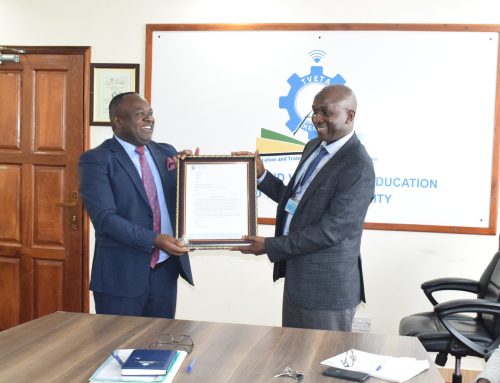Speech delivered by prof. Collette a. Suda, PHD, Fknas, EBS, Principal Secretary, Ministry of Education, Science and Technology, State Department of Science and Technology,During stakeholders workshop for validation of TVETA regulations, standards and guidelines at utalii hotel on the 12th, february, 2015.
Mr. Chairman,
It is a great honour for me to be invited by the TVET Authority to preside over this occasion where stakeholders today are expected to validate the TVET regulations, standards and guidelines that in the long run will assist in regulating subsector.
Ladies and Gentlemen,
The Ministry of Education, Science and Technology, made a commitment to work with all stakeholders in the education, science and technology sector not only to improve access and equity in TVET institutions but also quality and relevance of training.
The Ministry has consistently articulated its commitment to TVET in the national policy on education because of the prospects of poverty eradication, job creation, and sustainable development all leading to achievement of Vision 2030. TVET is a specialized education designed to empower trainees through the development of their technical skills, human abilities, cognitive understanding, attitudes and work habits in order to prepare them adequately for the world of work or position them practically for self-employment after graduation. It is along this line that the Ministry is developing a policy framework on CBET that will let graduates from middle level colleges be globally competitive as they will have acquired relevant practical skills once they would undergone through it.
Ladies and gentlemen,
I wish to emphasis that this workshop is important in that the regulations, standards and guidelines being discussed today, will address challenges facing quality and relevance training in TVET institutions which include, institutions issuing internal certificate, quality of training, enhancing standards across Ministries and departments offering training and to regulate training that fall below degree level.
It is therefore important to note that for purposes of assuring standards, quality and relevance in training institutions, these policies you are validating today shall be used for governing the establishment and accreditation of training institutions in accordance with the TVET Act, 2013. The law requires therefore that the Board in consultation with stakeholders establish guidelines to regulate this subsector of education and training.
The purpose of this workshop is thus to fulfill the requirements of law by involving the stakeholders of which you are part today. This is so in order to ensure that standards developed and quality of training in TVET institutions are strictly regulated, maintained and enhanced by educational institutions in line with changing needs of the society and the industry.
I consider this workshop a significant milestone in ensuring that the Ministry’s agenda of promoting quality and relevance in skills development as the engine for socio- economic development and global competitiveness will be achieved.
Ladies and Gentlemen,
As I conclude my remarks, I wish to caution TVET institutions across the country that in executing their mandate they need to carefully balance between students’ enrolment, staff and facilities available to avoid outstretching any of these critical resources.
While acknowledging that expansion is one way through which we can increase access in TVET institutions, quality must never be compromised. Institutions operating without registration and licensing will be closed down and any college offering training must not compromise on quality and relevance which must be in line with TVETA regulations, standards and guidelines.
I wish you fruitful deliberations and eventual consensus building in what brought you here today.


